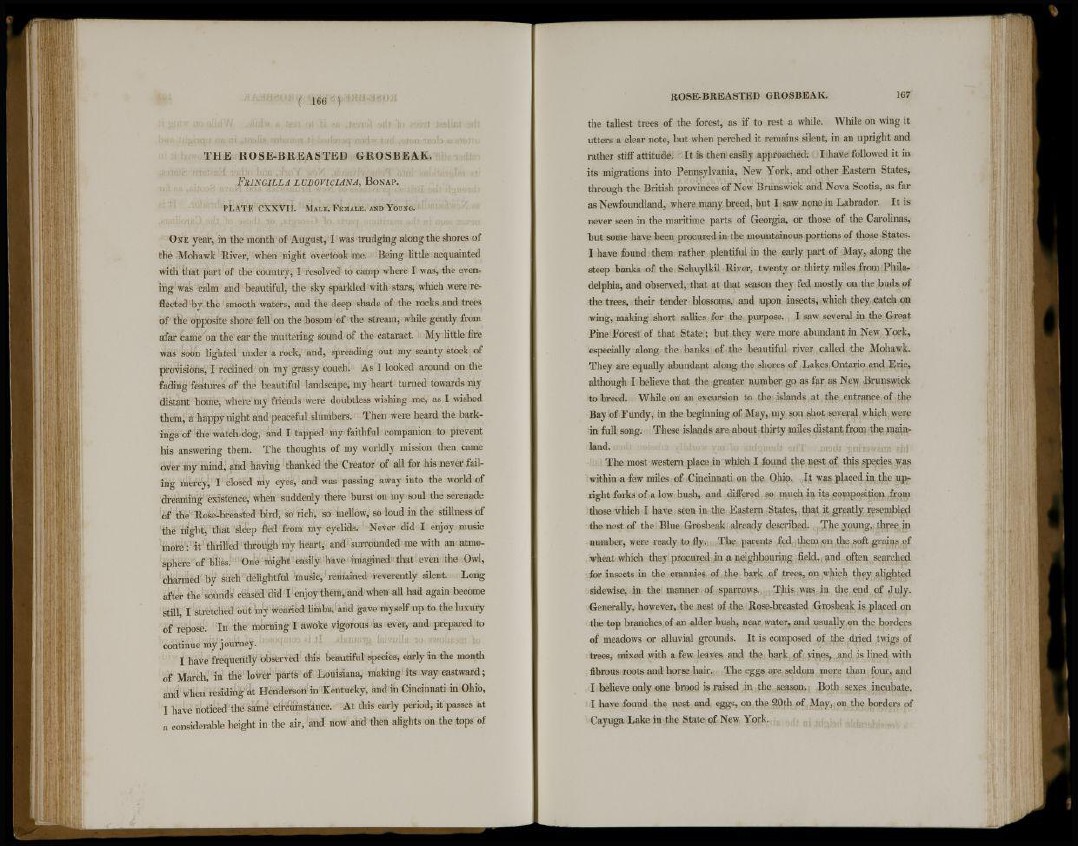
T H E R O S E - B R E A S T E D G R O S B E A K .
Fill X GILL A LUDOVICIANA, BoNAP.
P L A T E C X X V I I . MALE, F E M A L E , A N D Y O U N G .
ONE year, in the month of August, I was trudging along the shores of
the Mohawk River, when night overtook me. Being little acquainted
with that part of the country, I resolved to camp where I was, the evening
was calm and beautiful, the sky sparkled with stars, which were reflected
by the smooth waters, and the deep shade of the rocks and trees
of the opposite shore fell on the bosom of the stream, while gently from
afar came on the ear the muttering sound of the cataract. My little fire
was soon lighted under a rock, and, spreading out my scanty stock of
provisions, I reclined on my grassy couch. As I looked around on the
fading features of the beautiful landscape, my heart turned towards ray
distant home, where my friends were doubtless wishing me, as I wished
them, a happy night and peaceful slumbers. Then were heard the barkings
of the watch-dog, and I tapped my faithful companion to prevent
his answering them. The thoughts of my worldly mission then came
over my mind, and having thanked the Creator of all for his never failing
mercy, I closed my eyes, and was passing away into the world of
dreaming existence, when suddenly there burst on my soul the serenade
of the Rose-breasted bird, so rich, so mellow, so loud in the stillness of
the night, that sleep fled from my eyelids. Never did I enjoy music
more: it thrilled through my heart, and surrounded me with an atmosphere
of bliss. One might easily have imagined that even the Owl,
charmed by such delightful music, remained reverently silent. Long
after the sounds ceased did I enjoy them, and when all had again become
still, I stretched out my wearied limbs, and gave myself up to the luxury
of repose. In the morning I awoke vigorous as ever, and prepared to
continue my journey.
I have frequently observed this beautiful species, early in the month
of March, in the lower parts of Louisiana, making its way eastward;
and when residing at Henderson in Kentucky, and in Cincinnati in Ohio,
I have noticed the same circumstance. At this early period, it passes at
a considerable height in the air, and now and then alights on the tops of
ROSE-BREASTED GROSBEAK. 167
the tallest trees of the forest, as if to rest a while. While on wing it
utters a clear note, but when perched it remains silent, in an upright and
rather stiff attitude. It is then easily approached. I have followed it in
its migrations into Pennsylvania, New York, and other Eastern States,
through the British provinces of New Brunswick and Nova Scotia, as far
as Newfoundland, where many breed, but I saw none in Labrador. It is
never seen in the maritime parts of Georgia, or those of the Carolinas,
but some have been procured in the mountainous portions of those States.
I have found them rather plentiful in the early part of May, along the
steep banks of the Schuylkil River, twenty or thirty miles from Philadelphia,
and observed, that at that season they fed mostly on the buds of
the trees, their tender blossoms, and upon insects, which they catch on
wing, making short sallies for the purpose. I saw several in the Great
Pine Forest of that State ; but they were more abundant in New York,
especially along the banks of the beautiful river called the Mohawk.
They are equally abundant along the shores of Lakes Ontario and Erie,
although I believe that the greater number go as far as New Brunswick
to breed. While on an excursion to the islands at the entrance of the
Bay of Fundy, in the beginning of May, my son shot several which were
in full song. These islands are about thirty miles distant from the mainland.
The most western place in which I found the nest of this species was
within a few miles of Cincinnati on the Ohio. It was placed in the upright
forks of a low bush, and differed so much in its composition from
those which I have seen in the Eastern States, that it greatly resembled
the nest of the Blue Grosbeak already described. The young, three in
number, were ready to fly. The parents fed them on the soft grains of
wheat which they procured in a neighbouring field, and often searched
for insects in the crannies of the bark of trees, on which they alighted
side wise, in the manner of sparrows. This was in the end of July.
Generally, however, the nest of the Rose-breasted Grosbeak is placed on
the top branches of an alder bush, near water, and usually on the borders
of meadows or alluvial grounds. It is composed of the dried twigs of
trees, mixed with a few leaves and the bark of vines, and is lined with
fibrous roots and horse hair. The eggs are seldom more than four, and
I believe only one brood is raised in the season. Both sexes incubate.
I have found the nest and eggs, on the 20th of May, on the borders of
Cayuga Lake in the State of New York.